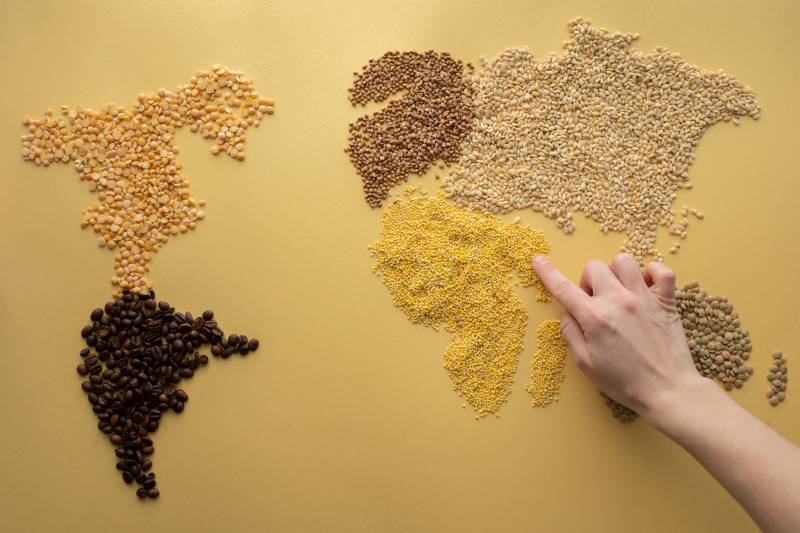Polycystic Ovary Syndrome (PCOS) is a complex hormonal disorder that affects predominantly women of reproductive age. PCOS presents a myriad of challenges, including irregular menstrual cycles, insulin resistance, weight gain, and fertility issues. While medical interventions play a crucial role in managing PCOS, there is growing interest in the role of dietary choices, particularly the inclusion of millets, in alleviating the symptoms and improving the quality of life for those living with PCOS. In this article, we explore the connection between PCOS and diet, focusing on the significant role millets can play in its management.
Understanding PCOS
PCOS is characterized by a constellation of symptoms and hormonal imbalances, including:
Irregular Menstrual Cycles: Women with PCOS often experience irregular or absent menstrual periods due to ovulation irregularities.
Hyperandrogenism: Elevated levels of male hormones (androgens) can lead to symptoms like acne, excessive hair growth (hirsutism), and male-pattern baldness.
Insulin Resistance: Many individuals with PCOS have insulin resistance, which can result in weight gain and an increased risk of type 2 diabetes.
Polycystic Ovaries: As the name suggests, polycystic ovaries may be observed on ultrasounds, though not everyone with PCOS has them.
Metabolic Disturbances: PCOS is often associated with metabolic disturbances such as obesity and abnormal lipid profiles.
The Role of Diet in PCOS
Diet plays a significant role in the management of PCOS. It can help mitigate insulin resistance, regulate hormones, and promote weight management. A balanced PCOS-friendly diet should focus on the following principles:
- Low Glycemic Index (GI) Foods: These foods release glucose into the bloodstream gradually, helping to stabilize blood sugar levels and reduce insulin resistance.
- High Fiber Content: Fiber-rich foods promote satiety, aid in weight management, and support healthy digestion.
- Lean Proteins: Including lean sources of protein can help maintain muscle mass and support metabolic health.
- Healthy Fats: Unsaturated fats like those found in nuts, seeds, and avocados are important for hormone regulation.
- Anti-Inflammatory Foods: Foods rich in antioxidants and anti-inflammatory compounds can help manage chronic inflammation associated with PCOS.
The Millet Advantage
Millets, a group of small-seeded, whole grains, offer a host of advantages for individuals with PCOS:
- Low Glycemic Index: Millets have a low GI, making them an ideal choice for regulating blood sugar levels. They prevent the rapid spikes and crashes associated with high-GI foods.
- Rich in Complex Carbohydrates: Millets provide a sustained release of energy, reducing the risk of sudden sugar cravings.
- High Fiber Content: Fiber in millets supports healthy digestion, promotes a feeling of fullness, and aids in weight management, which is crucial for many individuals with PCOS.
- Nutrient Density: Millets are packed with essential vitamins and minerals, rich in calcium, protein, iron, and amino acids, magnesium, iron, and B vitamins, which are often deficient in PCOS individuals.
- Anti-Inflammatory Properties: Millets contain antioxidants and phytonutrients that help combat inflammation, a common issue in PCOS.
How to incorporate Millets into your PCOS Diet
Millets that are best for PCOS are Ragi, Jowar, Bajra, and foxtail.
Sridhanya Positive millet (Little Millet, Kodo Millet, Foxtail Millet, Browntop Millet, Barnyard Millet) is good for fertility.
Choose your PCOS-friendly millet diet from –
Millet-Based Breakfasts: Start your day with millet-based porridge, upma, or idlis for a nourishing breakfast or a bowl of ragi flakes with yogurt and berries.
Replace Refined Grains: Swap out white rice, bread, and pasta with millet varieties like foxtail millet, pearl millet (bajra), or finger millet (ragi) for a lower-GI alternative.
Salads and Sides: Add cooked millets to salads for added texture and nutrients or serve them as a side dish to your main meal.
Soups and Stews: Incorporate millets into hearty soups and stews as a substitute for pasta or rice making your meals more filling and nutrient-dense.
Gluten-Free Baking: Explore gluten-free baking using millet flour for muffins, bread, and crackers.
Mixed Meals: Combine millets with legumes, lean proteins and plenty of vegetables to create balanced and nutritious meals that support weight loss efforts.
Use of Millets in PCOS Weight Loss
Polycystic Ovary Syndrome (PCOS) is a complex hormonal disorder that often comes with a range of challenges, including difficulties with weight management. Many individuals with PCOS struggle with weight gain and find it challenging to shed excess pounds. One dietary strategy gaining recognition for its potential benefits in managing PCOS-related weight issues is the inclusion of millets in the diet.
The PCOS-Weight Connection explained
PCOS is often associated with insulin resistance, which can lead to weight gain and make it difficult to lose weight. Insulin resistance means that the body’s cells do not respond effectively to insulin, causing elevated insulin levels. High insulin levels can lead to increased fat storage, especially in the abdominal area, and make it challenging for individuals to manage their weight.
Read More: PCOS VS PCOD
Role of Millets in PCOS Weight Management
- Low Glycemic Index (GI): Millets have a low glycemic index, which means they are digested and absorbed slowly, leading to a gradual and steady rise in blood sugar levels. This property helps stabilize blood sugar and insulin levels, making it easier for individuals with PCOS to manage their weight.
- High Fiber Content: Millets are rich in dietary fiber, which promotes satiety and reduces hunger. This can help control calorie intake and prevent overeating, a common challenge for those trying to lose weight.
- Complex Carbohydrates: The complex carbohydrates found in millets provide sustained energy, reducing the risk of energy crashes and cravings for sugary or high-calorie foods.
- Nutrient Density: Millets are packed with essential vitamins and minerals, including magnesium, iron, and B vitamins. When you are getting the nutrients your body needs, you are less likely to crave unhealthy, calorie-dense foods.
- Digestive Health: The fiber in millets supports healthy digestion, reducing bloating and discomfort, which can make it easier to engage in physical activity and maintain an active lifestyle.
Who should not eat Millets ?
Here are some groups of people who should be careful of their millet consumption:
Allergic Reactions: Individuals with known allergies to millets should avoid them altogether. Millet allergies are relatively rare but can cause allergic reactions, including skin rashes, itching, swelling, digestive discomfort, or even anaphylaxis in severe cases.
Kidney Stones: Millets, like some other grains, contain oxalates. Oxalates can contribute to the formation of kidney stones in susceptible individuals. If you have a history of kidney stones or are prone to them, consult your health professional before adding millets to your diet.
Thyroid Issues: Millets contain goitrogens, substances that can interfere with the function of the thyroid gland. People with thyroid disorders, particularly hypothyroidism (subclinical thyroid), should consume millets in moderation and ensure they are well-cooked, as cooking can reduce the goitrogenic content.
Medication Interactions: Some medications may interact with the nutrients in millets. For example, millets are a good source of magnesium, which can interfere with the absorption of certain antibiotics and osteoporosis medications. If you are on medication, discuss your millet consumption with your health professional to avoid potential interactions.
Infants and Young Children: Millets are generally considered safe for most people, but infants and very young children have delicate digestive systems. Introduce millets to their diet gradually and ensure they are cooked thoroughly to prevent any digestive discomfort.
Individual Dietary Tolerance: Like any food, individual tolerance to millets can vary. Some people may experience digestive discomfort, such as gas or bloating, when consuming millets. If you are new to millets, start with small portions and observe how your body reacts. If you experience discomfort, you may have to limit or avoid millets.
Celiac Disease: Millets are naturally gluten-free and can be a good alternative for individuals with gluten sensitivity. However, cross-contamination is possible during processing and packaging. People with celiac disease should choose certified gluten-free millet products to avoid accidental gluten exposure.
It is important to note that while for most people, millets are a nutritious and healthy addition to their diet. However, if you fall into any of the categories mentioned above, it is advisable to consult with a healthcare professional or a registered dietitian before making significant changes to your diet or increasing your millet consumption. They can provide personalized guidance based on your specific health needs and dietary preferences.
Embrace the Power of Millets
A PCOS diagnosis can be overwhelming, but with the right dietary choices, individuals can take significant steps toward managing their condition aiming to manage their weight and improving their quality of life. Millets, with their low glycemic index, high fiber content and nutrient density, make them an excellent choice for promoting satiety, stabilizing blood sugar levels, and supporting overall health.
However, it is essential to remember that while millets can be a helpful component of a weight loss strategy, they should be part of a holistic approach that includes regular physical activity, portion control, and consultation with a healthcare professional or registered dietitian. With these steps, individuals with PCOS can work towards achieving their weight management goals while enjoying the nutritional benefits of millets. Remember that while diet plays a crucial role, it should complement a comprehensive PCOS management plan developed in consultation with healthcare professionals. Embracing the power of millets in your PCOS diet can be a delicious and nutritious step toward a healthier and happier life.
Read More: 08 Healthy Foods to include in PCOS Diet
1.Dietary Patterns and Polycystic Ovary Syndrome: a Systematic Review
https://www.ncbi.nlm.nih.gov/pmc/articles/PMC8643565/
2.Significant Improvement Selected Mediators of Inflammation in Phenotypes of Women with PCOS after Reduction and Low GI Diet
https://www.ncbi.nlm.nih.gov/pmc/articles/PMC5474536/
3.Millets: The future crops for the tropics
https://www.ncbi.nlm.nih.gov/pmc/articles/PMC10695985/
4.Defining the impact of dietary macronutrient balance on PCOS traits







